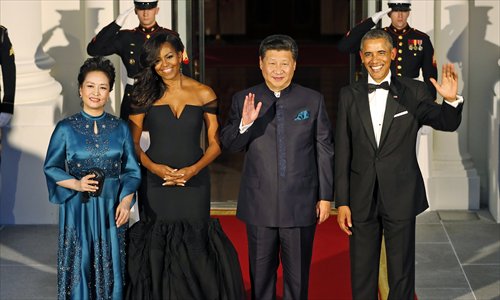Xi’s visit achieves key outcomes
Trip sends a positive signal that countries will jointly cope with challenges

Chinese President Xi Jinping speaks at the United Nations Sustainable Development Summit in New York City on Saturday. Xi announced on Saturday that Beijing will establish an assistance fund with an initial pledge of $2 billion to help developing countries implement a global sustainable development agenda over the next 15 years. Photo: AFP

Chinese President Xi Jinping and US President Barack Obama wave accompanied by their wives Peng Liyuan and Michelle Obama as they arrive for a state dinner at the White House in Washington, DC on Friday. Photo: AP

China and the US have agreed to continue building a new model for major-country relationship based on mutual respect and win-win cooperation, according to an outcomes list of Chinese President Xi Jinping's state visit to the US.
Analysts said that both countries' reaffirmation of a new pattern of diplomatic ties has been the fundamental and pivotal achievement in the outcomes list.
Xi on Friday rounded off his first state visit to the US with several important results. He said the visit sent a positive signal that the two countries will strengthen cooperation and jointly cope with challenges.
During his in-depth, candid and constructive talks with US President Barack Obama, the two sides reached extensive consensus and arrived at a series of important outcomes, covering the new model for major-country relationship between China and the US, bilateral cooperation, Asia-Pacific affairs and global challenges.
Aside from agreeing to build a new model for major-country relationship, the two countries said they would maintain close communication and exchanges at all levels, further expand practical cooperation at bilateral, regional and global levels and manage differences in a constructive way to achieve new concrete results in Sino-US relations, according to the outcomes list.
Avoiding 'Thucydides Trap'
"Although the interpretation of the concept - a new model for major-country relationship - differs between China and the US, the US still agreed with China that both countries should explore a model of diplomatic ties distinct from those involving inevitable conflicts between existing and emerging powers," Zha Xiaogang, a research fellow at the Shanghai Institute for International Studies, told the Global Times.
Obama in effect gave a positive but indirect response to the concept, as he said he does not believe in the "Thucydides trap" where conflicts are inevitable between existing and emerging powers, Yang Xiyu, a senior research fellow with China Institute of International Studies, told the Global Times.
The US has already practiced the concept of non-conflict and non-confrontation, despite avoiding any reference to the concept, Da Wei, director of the Institute of American Studies at the China Institute of Contemporary International Relations, told the Global Times, citing military cooperation in the outcomes list as an example.
Making progress
According to the outcomes list, China and the US have reaffirmed their commitment to implementing the consensus reached by the countries' leaders and militaries, facilitate sustained and substantive dialogues and communication, and further advance the development of China-US military-to-military relations.
At the invitation of the US Pacific Command, the Chinese Navy will participate in the RIMPAC-2016 joint exercise.
Separately, the two sides will encourage the China Coast Guard and its US counterpart to sign cooperation documents and facilitate cooperation between the two agencies in such areas as personnel exchanges, vessel visits, intelligence and information sharing and a joint campaign against illegal and criminal maritime activities.
Yang said such institutionalized dialogues and collaboration mechanisms will dispel suspicions and enhance mutual trust.
Experts said they agree that economic cooperation was another highlight.
China and the US recognize the progress of the ongoing bilateral investment treaty negotiations, a step Yang said would establish a paradigm of investment agreements between other developing countries and developed countries.
Both countries also affirmed that the international financial architecture has evolved over time to meet the changing scale, scope, and diversity of challenges and to include new institutions as they incorporate its core principles of high standards and good governance.
Zheng Qirong, vice president of China Foreign Affairs University, told the Global Times that the move shows the US has softened its stand on the China-initiated Asian Infrastructure Investment Bank.
Xi Jinping arrived in New York City early Saturday morning for a series of UN summits covering a wide range of topics, including the post-2015 development agenda, women's empowerment, and South-South cooperation.
Xinhua contributed to this story